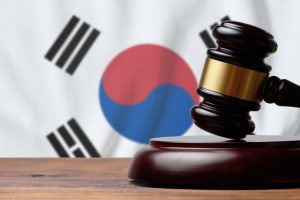A president’s wife receives a Dior bag as a gift – it’s a stereotypical vision of East Asian corruption. But the demotion this May of prosecutors investigating South Korean First Lady Kim Keon-hee’s videotaped acceptance of an apparent bribe raises the possibility that the case will be swept under the rug. That would be the culmination of the long legacy of politicized justice in South Korea, which has intensified under Kim’s husband, President Yoon Suk-yeol.
A former prosecutor general, Yoon swept into the presidency in 2022 after uniting conservatives behind his opposition to the liberal Moon Jae-in administration’s drive to strip the prosecution of its ability to investigate crimes. For the past century, the Korean prosecution has served as the heart of the Korean justice system – issuing indictments, conducting investigations, and directing police operations, all while remaining immune to oversight.
Legal activists often decry the country as a “Republic of Prosecutors.” Three of the last four presidents faced their wrath, as have countless politicians and civil servants. Ambitious Korean prosecutors are well-known for strategically withholding indictments to curry favor and build political capital. Notable former prosecutors have effectively used professional connections to shield themselves from investigations.
The Korean prosecution is a fiercely hierarchical organ. Rank and file prosecutors have largely shown loyalty to Yoon, their former boss, and top prosecutors dominate the ranks of his appointees. Under his administration, the prosecution increased its quest for political retribution. Of search and seizure warrants issued against politicians, 95 percent were aimed at figures in the liberal Democratic Party, according to new research published by the civic group People’s Solidarity for Participatory Democracy.
Prosecutors, like all state organs, were aligned with right-wing authoritarian governments that ruled South Korea from 1949 to 1987. Prosecutors collaborated with South Korea’s feared intelligence agency, the KCIA, to fabricate offenses and torture and murder leftist and pro-democracy activists, as well as innocents caught up in their crackdowns. Looking back further, the South Korean prosecution resembles a facsimile of its Japanese colonial predecessor, which was known for rounding up in Korean subjects by the hundreds in mass detentions.
In the 1990s and 2000s a succession of democratization activists-turned-presidents sensed that South Korea’s prosecutors had a lack of accountability, and proposed various limits on their power. Former President Moon, seeing an opportunity to cast aside the legacy of authoritarianism and colonialism, launched a campaign to fully strip the prosecution of its investigative authority in 2019. Moon and his Democratic Party lawmakers, however, ended up only limiting the number of crimes the prosecution could investigate. They also established an investigation office for civil servants, with the prosecution itself within its remit.
The liberals’ solution to the prosecution’s investigation monopoly, the new Corruption Investigation Office for High-ranking Officials (CIO), began work following the transition to the conservative Yoon administration. The result has been to create a two-tiered justice system, with conservatives investigated by the CIO and liberals by the prosecution.
South Korea already had serious problems with public faith in its justice system; trust in the judiciary was at just 26 percent as of 2022, compared to the OECD average of 55.7 percent. With rival investigative agencies both tainted with naked partisanship, the situation is only worsening. While the prosecution chases Yoon’s liberal rival Lee Jae-myung on corruption charges, the CIO pursued the president’s defense minister over manipulating an investigation into a soldier’s death.
The CIO is a newcomer; its hold is tenuous and its workforce miniscule, with just a handful of investigators. The prosecution, however, looks every bit its old self as the dominant force in South Korean politics, aligned with conservatives but retaining the power to threaten them, as Yoon did when he led the investigation of former President Park Geun-hye on corruption charges in 2017.
The Reform Korea Party, a liberal splinter party that emerged as the biggest success story of this spring’s South Korean parliamentary election, has a nearly single-minded focus on judicial reform and stripping the prosecution of all investigative power. The party’s leader, Moon’s former Justice Minister Cho Kuk, was handed a prison sentence over academic fraud charges. Many liberals believe this was retaliation for his previous efforts to restrict prosecutors’ investigative authority during the Moon administration.
Ahead of the election, Cho’s party pushed for a special counsel to investigate the bribery allegations against Yoon’s wife if the prosecution failed to do so. In bowing to this pressure and opening an investigation into the first lady, the prosecution trained its sights on Yoon for the first time.
While it’s still unclear why the prosecutors investigating Kim Keon-hee were reshuffled, Yoon’s Justice Ministry is in charge of all prosecutorial appointments. If the president is proven to have directed the dismantling of a prosecutorial investigation into the first lady, then a special counsel may be the only way to bring about an effective investigation.
However, this paints a sorry picture of justice in South Korea – a system so tainted with loyalties and political rivalries that no one institution can be trusted to impartially enforce the country’s law.

































